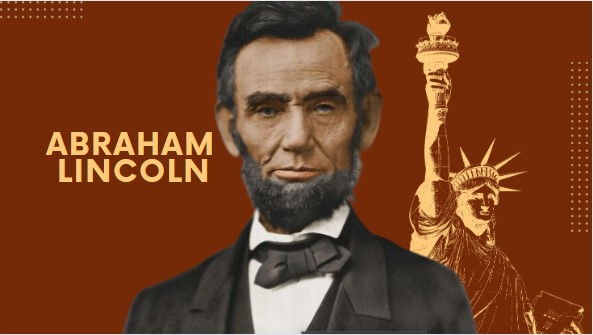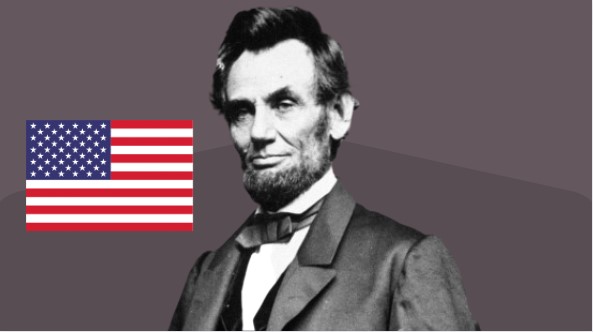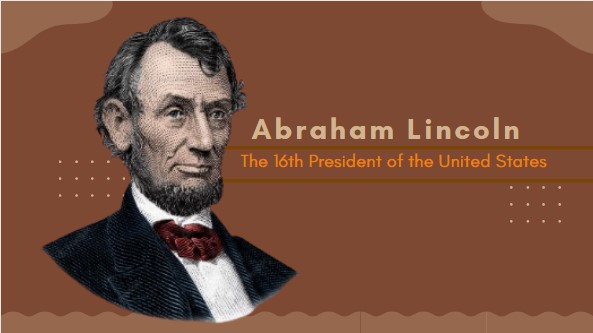
Abraham Lincoln, one of the most revered figures in American history, was a statesman, lawyer, and the 16th President of the United States. His leadership during the tumultuous period of the Civil War and his unwavering commitment to the abolition of slavery have left an indelible mark on the nation’s history. This article delves into the life and times of Abraham Lincoln, exploring his early years, political career, the challenges of the Civil War, and his enduring legacy.
Early Life and Background
Born on February 12, 1809, in a log cabin in Kentucky, Lincoln’s humble beginnings shaped his perspective on life and fueled his drive for success. His childhood was marked by hardship, and he received only limited formal education. Nevertheless, his insatiable appetite for learning led him to self-educate, becoming well-versed in law and literature.
Abraham Lincoln family
Abraham Lincoln was born to Thomas Lincoln and Nancy Hanks Lincoln. Thomas Lincoln was a farmer and carpenter, while Nancy Hanks Lincoln’s background must be fully documented. She died when Abraham Lincoln was just nine years old.
Abraham Lincoln had one sister, Sarah Lincoln, who was two years older than him. Sarah Lincoln married Aaron Grigsby in 1826 but sadly died during childbirth in 1828. This tragic event deeply affected Abraham Lincoln, as he was very close to his sister.
In 1842, Abraham Lincoln married Mary Todd, who came from a prominent Kentucky family. They had four sons: Robert Todd Lincoln, Edward Baker Lincoln, William Wallace Lincoln, and Thomas “Tad” Lincoln. Tragically, Edward died at age four in 1850, and Willie passed away at age 11 during Lincoln’s presidency in 1862.
Only one of Lincoln’s sons, Robert Todd Lincoln, survived into adulthood and had a successful career in law and politics, serving as the U.S. Secretary of War and as the U.S. Minister to the United Kingdom.
Despite the hardships and personal losses he faced, Abraham Lincoln’s leadership during one of the most challenging periods in American history, the Civil War, and his efforts to abolish slavery have earned him a revered place in the nation’s history.
Bio/Wiki of Abraham
| Name | Abraham Lincoln |
| Born | February 12, 1809 |
| Birthplace | Hardin County, Kentucky |
| Died | April 15, 1865 |
| Place of Death | Washington, D.C., United States |
| Education | Little formal education; Self-taught lawyer |
| Spouse | Mary Todd Lincoln |
| Children | 4 (Robert, Edward, Willie, Tad) |
| Occupation | Lawyer, Politician, 16th President of the United States |
| Political Party | Republican |
| Presidential Term | March 4, 1861 – April 15, 1865 |
| Vice President | Hannibal Hamlin (1861-1865), Andrew Johnson (1865) |
| Notable Accomplishments | Emancipation Proclamation, Preserving the Union during the Civil War, Homestead Act, Transcontinental Railroad, National Banking System, Gettysburg Address |
| Assassination | Assassinated by John Wilkes Booth at Ford’s Theatre, Washington, D.C. |
| Legacy | Regarded as one of the greatest U.S. presidents, iconic figure in American history, symbol of leadership during times of crisis, instrumental in abolishing slavery |
Entry into Politics
Lincoln’s foray into politics began as a young man when he moved to Illinois and started his legal practice. His wit, eloquence, and understanding of the law earned him respect in the community, and he soon ventured into public service. As a member of the Illinois State Legislature, Lincoln advocated for improvements in infrastructure and education.
The Road to the Presidency
In the 1850s, the nation faced deep divisions over slavery and states’ rights. Lincoln, firmly opposing the extension of slavery into new territories, gained national recognition during the Lincoln-Douglas debates. His principled stance on these matters set the stage for his presidential campaign in 1860.
The Civil War
The Civil War of Abraham Lincoln, also known as the American Civil War, was a defining moment in the history of the United States. Lasting from 1861 to 1865, it was a conflict between the Northern states, known as the Union, and the Southern states, known as the Confederacy.
Abraham Lincoln, the 16th President of the United States, played a central role in the war’s unfolding and resolution. He assumed office on March 4, 1861, just a month before the Confederate forces attacked Fort Sumter in South Carolina, marking the beginning of the Civil War. Lincoln, a staunch opponent of slavery, sought to preserve the Union and prevent the secession of Southern states.
The primary cause of the war was the stark divide between the Northern states, which were rapidly industrializing and advocated for the abolition of slavery, and the agrarian-based Southern states, where slavery was deeply ingrained and seen as essential to their economy and way of life. As tensions escalated, the election of Abraham Lincoln in 1860 catalyzed for Southern states to secede, fearing that he would work to end slavery.
Lincoln’s presidency was marked by his unwavering commitment to preserving the Union and his determination to abolish slavery. He believed the United States could not endure as a half-slave, half-free nation. His Emancipation Proclamation, issued on January 1, 1863, declared that all enslaved people in Confederate-held territory were to be set free, transforming the war’s purpose from solely preserving the Union to ending slavery.
Throughout the war, Lincoln faced numerous challenges and criticisms from the public and political figures. He struggled to find capable military leaders and faced opposition to his policies, but his leadership and steadfastness remained crucial in guiding the Union through the darkest times.
The war was one of the bloodiest conflicts in American history, with countless lives lost on both sides. Battles like Gettysburg, Antietam, and Vicksburg left lasting scars on the nation. However, by 1865, the Union forces emerged victorious, and the Confederate army surrendered. On April 9, 1865, General Robert E. Lee surrendered to General Ulysses S. Grant, effectively ending the war.
Tragically, just days after the Confederate surrender, Abraham Lincoln was assassinated on April 14, 1865, by John Wilkes Booth, a Southern sympathizer. His assassination devastated the nation, robbing it of a leader whose vision was instrumental in shaping the war’s outcome.
The Civil War of Abraham Lincoln had far-reaching consequences. It led to the abolition of slavery through the Thirteenth Amendment in December 1865, forever changing the course of American history. Despite the immense loss and suffering, the war laid the foundation for a more unified nation that would continue to strive for equality and justice for all its citizens. Lincoln’s legacy symbolizes leadership during one of the nation’s most challenging periods.
Re-election and Second Term
Lincoln was re-elected in 1864 despite facing significant opposition, showcasing the public’s trust in his leadership. In his second term, Lincoln aimed to heal the nation’s wounds and usher in an era of Reconstruction, seeking to rebuild the South and grant civil rights to freed slaves.
Assassination and Legacy
In a tragic turn of events, Abraham Lincoln was assassinated on April 14, 1865, just days after the war’s end. His untimely death shocked the nation, but his legacy endured. Lincoln’s vision for a united and equal America laid the groundwork for the country’s progress in the years to come.
Personal Traits and Beliefs
Known for his storytelling and humor, Lincoln’s personality was both approachable and genuine. He believed in the power of democracy and the importance of preserving the Union. His unwavering commitment to justice and fairness earned him the respect of allies and adversaries alike.
Famous Speeches and Writings
Abraham Lincoln’s speeches, notably the Gettysburg Address, have become iconic examples of powerful rhetoric. The concise yet profound words of the Gettysburg Address reflected Lincoln’s dedication to the principles of liberty and equality for all.
Historical Importance
Lincoln’s role in preserving the Union and ending slavery solidifies his place as one of the most influential figures in American history. His presidency marks a defining moment, shaping the nation’s course and its commitment to civil rights.
Impact on Civil Rights
Beyond the 19th century, Lincoln’s legacy continues to resonate in the civil rights movement. His dedication to equality inspires activists and leaders who fight for justice in the face of adversity.

Personal Reflections
As a writer, exploring Abraham Lincoln’s life has been a journey of inspiration and admiration. His commitment to justice, resilience, and ability to unite a nation amidst its darkest hour serves as a timeless lesson.
The Unfinished Work: Challenges Ahead
While significant progress has been made, challenges related to equality and justice persist. Lincoln’s example reminds us that pursuing a perfect union requires continuous effort and dedication.
Conclusion
Abraham Lincoln’s life exemplified the qualities of a true leader. From his humble beginnings to the presidency, he navigated the nation through one of its most trying times. His legacy endures as a symbol of hope, equality, and unity.
FAQs
1. What were Abraham Lincoln’s early political experiences?
– Lincoln began his political career in the Illinois State Legislature, where he advocated for various reforms.
2. What was the significance of the Emancipation Proclamation?
– The Emancipation Proclamation declared that all slaves in Confederate states were to be set free, marking a crucial step towards abolishing slavery.
3. What was Lincoln’s approach to leadership during the Civil War?
– Lincoln displayed both strategic acumen and compassionate leadership, aiming to preserve the Union and bring an end to slavery.
4. What is the enduring impact of Lincoln’s legacy on civil rights?
– Lincoln’s commitment to equality continues to inspire the civil rights movement, serving as a beacon for advocates of justice.
5. How did Lincoln’s tragic assassination impact the nation?
– Lincoln’s assassination shocked the nation and emphasized the need to carry forward his vision of a united and equal America.






